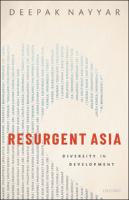Resurgent Asia
Diversity in Development
Abstract
Resurgent Asia analyses the phenomenal transformation of Asia, which would have been difficult to imagine, let alone predict, fifty years ago, when Gunnar Myrdal published Asian Drama. In doing so, it provides an analytical narrative of this remarkable story of economic development, situated in its wider context of historical, political, and social factors, and an economic analysis of the underlying factors, with a focus on critical issues in the process of, and outcomes in, development. In 1970, Asia was the poorest continent in the world, marginal except for its large population. By 2016, it accounted for three-tenths of world income, two-fifths of world manufacturing, and one-third of world trade, while its income per capita converged towards the world average. However, this transformation was associated with unequal outcomes across countries and between people. The analysis disaggregates Asia into its four constituent sub-regions—East, Southeast, South, and West—and further into fourteen economies—China, India, South Korea, Indonesia, Turkey, Taiwan, Thailand, Philippines, Malaysia, Singapore, Pakistan, Bangladesh, Vietnam, and Sri Lanka—which account for more than four-fifths of its population and income. This book enhances our understanding of development processes and outcomes in Asia over the past fifty years, draws out the analytical conclusions that contribute to contemporary debates on development, and highlights some lessons from the Asian experience for countries elsewhere. It is the first to examine the phenomenal changes that are transforming economies in Asia and shifting the balance of economic power in the world, while reflecting on the future prospects in Asia over the next twenty-five years. A rich, engaging, and fascinating read.
Keywords
Asian development, balance of power, catch-up, development outcomes, economic growth, economic transformation, future prospects governments, historical perspective, industrialization, inequality, initial conditions, macroeconomics, markets, openness, politics, poverty, States, structural change, unequal outcomes, world economyDOI
10.1093/oso/9780198849513.001.0001Publisher
Oxford University PressPublisher website
https://global.oup.com/Publication date and place
Oxford, 2019Grantor
Classification
Economics
Development economics and emerging economies
Politics and government


 Download
Download Web Shop
Web Shop